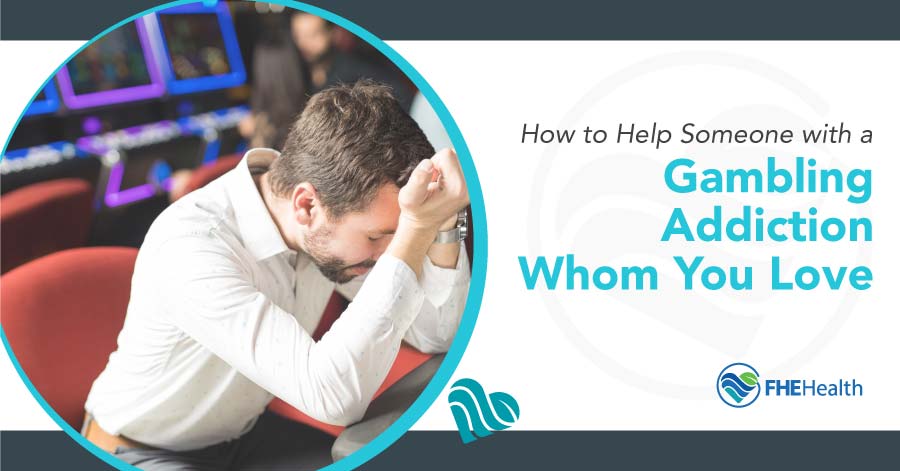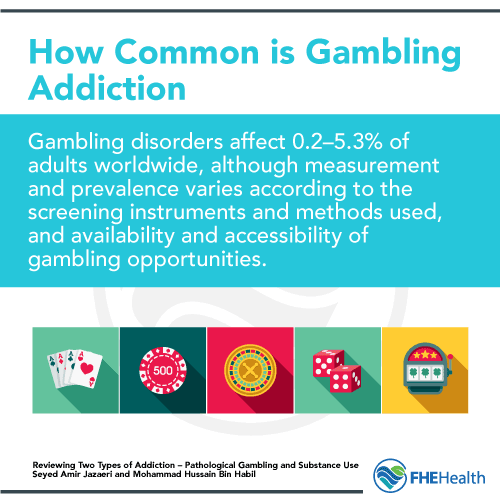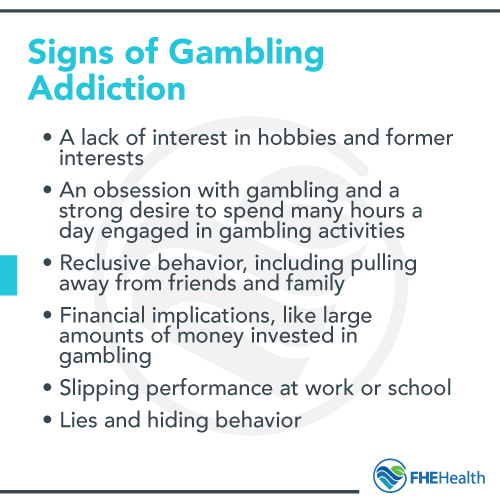
Gambling addiction is a very real problem that affects roughly 10 million Americans, and figuring out how to stop someone gambling isn’t easy. Defined as compulsive behavior related to the rush that comes with betting money and winning, whether on sporting events or card games, gambling addiction can happen to anyone who makes a habit out of rolling dice or betting at the track.
However, to many people, the idea of a behavior being addictive, like shopping, food, gambling, or even sex, isn’t as commonplace as an addiction to heroin or cocaine. As such, it’s easier to ignore the signs in favor of something more benign, like a bad habit. If you suspect someone you love is addicted to gambling, it’s important to acknowledge the reality of the situation and do your best to intervene.
What Is a Gambling Addiction?

Gambling can be a fun event, particularly when incorporated into daily life on an occasional basis, like a visit to the casino or a day at the horse track. However, when gambling surpasses fun and becomes a priority, a gambling addiction may be at hand.
Gambling addictions are very similar in nature to other addictions. Those affected are more concerned about gambling than anything else, invest all money in gambling and cannot go days on end without gambling in some regard. As the array of gambling outlets can vary greatly, from slot machines to dice and card games to sports betting, there are plenty of ways to indulge in gambling. Regardless of outlet, gambling addiction often manifests in the same obsessive way.
As legal sports gambling expands across more states in response to a Supreme Court ruling in 2018, the rates of gambling addiction nationwide may increase.
Signs of a Gambling Addiction
 Similar to an addiction to drugs or alcohol, a gambling addiction will yield signs of abuse. These include:
Similar to an addiction to drugs or alcohol, a gambling addiction will yield signs of abuse. These include:
- A lack of interest in hobbies and former interests
- An obsession with gambling and a strong desire to spend many hours a day engaged in gambling activities
- Reclusive behavior, including pulling away from friends and family
- Financial implications, like large amounts of money invested in gambling
- Slipping performance at work or school
- Lies and hiding behavior
It is important to note that gambling addiction is still extremely serious, even though no substances are in use. The emotional and psychological response to gambling can be intense, creating a similar high to using a drug due to the release of dopamine in the brain. While withdrawal may not result in the same dangerous physical side effects as something like alcohol, quitting gambling can be as challenging as overcoming any other substance use disorder.
How to Stop Someone Gambling
Perhaps your loved one, like a spouse or parent, picked up a casual gambling hobby, like enjoying a Saturday a month at the track with friends or stopping by the local casino on the way home from work. Amounts used in betting were initially small, and the time commitment was minor.
However, in time, maybe this started to change. A casual day at the track became every weekend and after work, or the casino became a regular hangout spot. Instead of food, groceries and retirement savings, money started to go toward the slots or the ponies. Soon, your loved one started using sick days to spend more time gambling or giving up a good night’s sleep in favor of online poker. Before long, gambling became the only thing that mattered.
Seeing this pattern in a friend or family member can be extremely distressing. Watching a happy, healthy person turn into a shell of his former self in favor of gambling isn’t easy — but you don’t have to stand idly by. Taking action early can minimize future damages and increase the likelihood of successful recovery.
Accept Reality
It’s easy to live in denial about a loved one’s poor habits, but failing to accept the reality of a situation won’t help anyone. If you suspect something is changing in a friend or family member’s behavior or lifestyle choices due to gambling, it’s best to look at the situation as objectively as possible. Ignoring warning signs won’t make them go away, so rely on the evidence available to you to concede that yes, a gambling addiction may be at the cause of personality changes.
Speak Up
Confronting someone is never easy, but it’s an important step. You don’t need to be accusatory; a simple statement like “I’ve noticed you seem to be gambling a lot more than usual. Is everything okay?” can go a long way in opening the door to a productive discussion.
Don’t Judge
It’s compelling to judge someone you see making poor life choices, but try to refrain. When you bring up the topic, start your sentences with “I” rather than “you.” Saying something like “I’ve noticed that you’re spending more money on gambling” — rather than “you’re wasting your money on gambling” — is a lot less accusatory and, thus, less likely to incite anger.
Share Consequences
No addiction is consequence-free. By driving home the negative ramifications, you may be able to trigger the wake-up call necessary for your loved one to get help. Gentle statements like “Is everything going okay with your child’s college fund?” and “How is saving for a house going with all of your gambling?” or “How is your relationship doing? Is your wife okay with your gambling?” may serve as a reminder that gambling comes at a price.
Prepare for a Response
For someone deep in addiction, even non-confrontational statements can trigger strong emotions. As such, go into your conversations realizing that anger or aggression may be a possibility.
If your loved one admits that their gambling has accelerated and it’s probably unhealthy, you may be able to get ahead of the problem. However, a defensive or combative answer may indicate that a problem has already begun to spin out of control.
Encourage Getting Help
Getting help is imperative for any substance use disorder, and gambling is no different. If your loved one seems open to a conversation, even an angry one, be sure to promote treatment. You don’t have to get pushy in doing so, but saying something like “I’m concerned about you. I really think you should consider getting help” can plant the first seed. If inpatient treatment doesn’t seem immediately possible, suggest help lines or support groups instead to encourage positive steps forward.
It’s possible that your loved one will resist all efforts to seek recovery. This is normal. Continue to provide emotional support and do your best to communicate the negative consequences you are witnessing as well as the importance of getting treatment.
If you or someone you love is showing troubling symptoms of gambling addiction, FHE Health can help. Please contact us today to learn more about our gambling treatment therapy.






